The highest volunteer recognition bestowed by the ICSC Board of Trustees, the Distinguished Service Awards recognize individuals whose dedication has made a lasting impact. Through mentorship, leadership and service on committees and as faculty, they have quietly shaped the future of the Marketplaces Industry. Their contributions foster growth, education and connection within the ICSC community. Read on or click below to jump to each honoree’s profile.
John Crombie’s Career Took Off After an Unexpected Jump Into Retail
Gerald Pouncey Jr. Guides the Future of Environmental and Land-Use Policy
How Sam Shenkus Shaped Hawaii’s Retail Landscape
Betsy Laird Has Spent More Than 2 Decades Advocating for ICSC

The 2025 ISCS Trustees’ Distinguished Service Award honorees: Cushman & Wakefield’s John Crombie, Morris, Manning & Martin’s Gerald Pouncey Jr., The Festival Cos.’ Sam Shenkus and ICSC’s Betsy Laird
John Crombie’s Career Took Off After an Unexpected Jump Into Retail
John Crombie is a confirmed believer in the “10,000-hour rule,” journalist and author Malcom Gladwell’s theory that it takes that many hours of dedicated practice to master a complex skill. Crombie is an accomplished guitarist and credits the precept with getting him there. The 10,000-hour rule paid off during a milestone season in the 1980s, when — after years of teaching the sport — he logged 1 million vertical feet, nearly 200 miles, skiing in Jackson Hole, Wyoming, while working as a ski tour representative.

Cushman & Wakefield’s John Crombie prepares to take the plunge in Jackson Hole, Wyoming. Photo courtesy of John Crombie
Crombie unknowingly embarked on another 10,000-hour journey in 1999 when he attended his first ICSC event, in the ski resort town of Whistler, British Columbia. He was the branch manager at Royal LePage in Edmonton, Alberta at the time and new to retail, having spent more than a decade on the office side of commercial real estate in brokerage and property management. He thus had some reluctance about attending, but “it was a real eye-opener,” recalled Crombie, now executive managing director in the Canadian retail services business for Cushman & Wakefield in Toronto — and not just because he could mix business with skiing.
“My boss thought I knew something about retail, and I didn’t know what I was getting into,” he said. “But I could see the business opportunities were abundant. It’s something I look back on as a milestone in my life.” Indeed, that 1999 event convinced Crombie to get more involved with ICSC, and if his accomplishments within the organization in the two-and-a-half decades since could be measured on a ski lift, he has climbed another 1 million feet.
“I joined a Canadian committee, which led to another committee, then another committee along with industry speaking engagements, and I never looked back,” he said. “I met some amazing people and found that retail was much more in-depth than other disciplines. ICSC allowed me to flourish. I started sharpening my skills and expertise and eventually became known as the go-to retail person.”
Crombie’s love of facts and figures led him to the ICSC Canadian Research Group, and later, the North American Research Group. In 2016, he won the ICSC Gold Medallion Award, recognizing his research excellence. Crombie has served as chair or co-chair of the ICSC@CANADA event four times over the past decade and recently stepped down from a two-year stint as a director in the Canada Marketplace Council. He also served on ICSC’s diversity, equity and inclusion working group for two years.
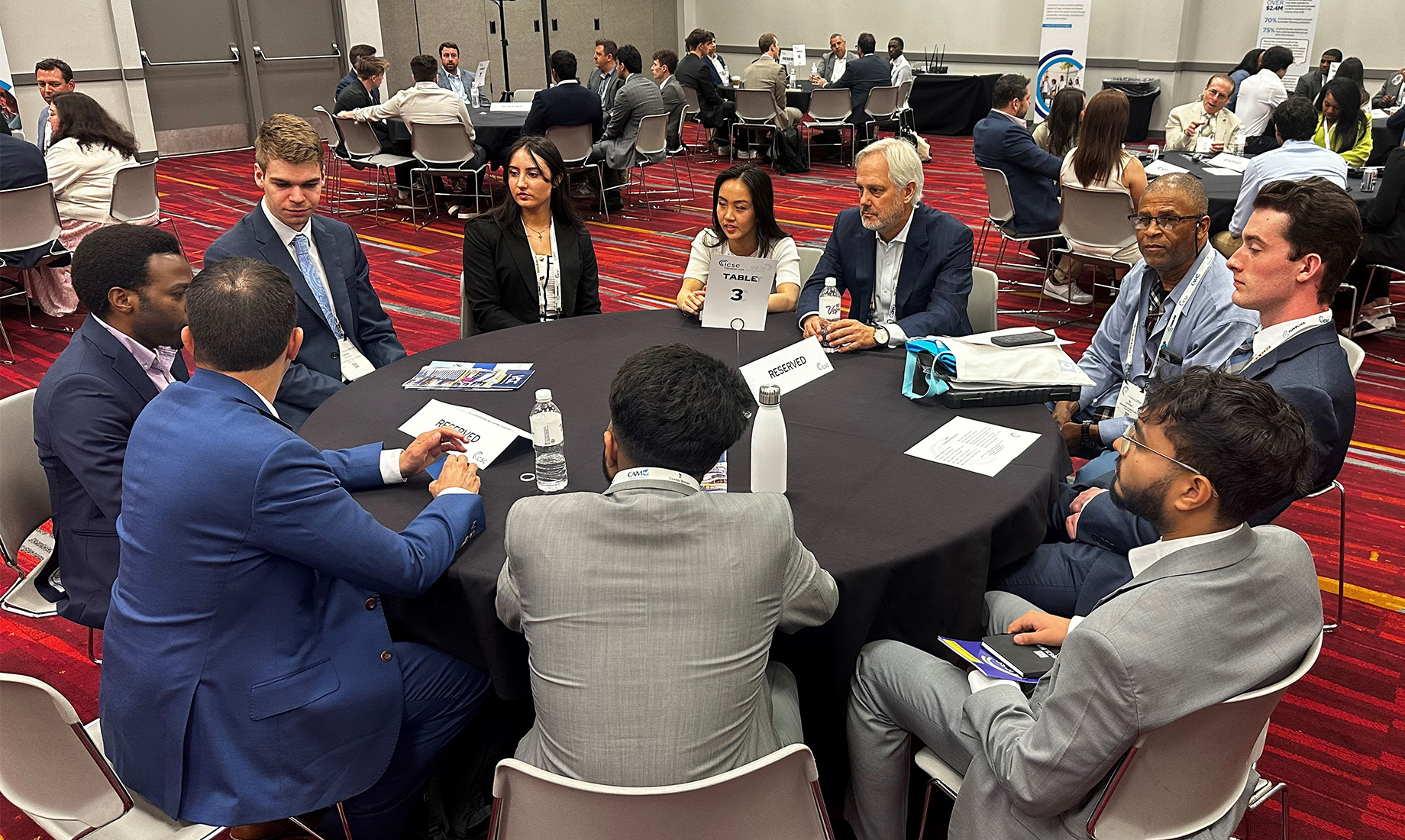
Crombie talked with students at an ICSC LAS VEGAS roundtable event in 2024. Photo courtesy of John Crombie
Though he stepped down from ICSC Foundation Canada’s board of directors in 2023 after six years, Crombie has continued to work with ICSC’s charitable arm. The Foundation provides scholarships and resources to students and promotes community engagement. In his professional roles, he has enjoyed helping people advance their careers, and ICSC Foundation Canada gave him the opportunity to serve young people in a similar capacity.
Crombie’s enthusiasm when working with students was evident to ICSC Foundation president Lauri Novick, but it was only one aspect of his service for the organization, she said. Taking a leading role in fundraising during the difficult pandemic years, Crombie served on the Foundation’s development committee and was chair of the nominating committee, which helps identify new Foundation board members. “John was incredibly passionate about the mission of the Foundation and took it upon himself to volunteer for every opportunity we had, whether it was meeting with students and advising them on a potential career or how to land an internship or helping to plot the Foundation’s strategic goals,” she said. “He was a leader but also a doer. He’d roll up his sleeves and get to work.”
Crombie continues to enjoy mentoring. At ICSC events, he sits down with students, listens to what they want to do with their careers and offers them direction. He also accompanies students as they visit booths, meet clients and learn about the business. “Helping that next generation pursue a career in retail real estate remains a great pleasure,” he said. “It’s a way to give back, and I’m delighted I have those opportunities.”
Outside ICSC, Crombie leads an effort to expand Cushman & Wakefield’s Canadian retail platform. The task that’s consuming most of his time today, however, is a massive assignment to dispose of excess HSBC Bank Canada branch locations across the country after the financial institution was sold to the Royal Bank of Canada last year.
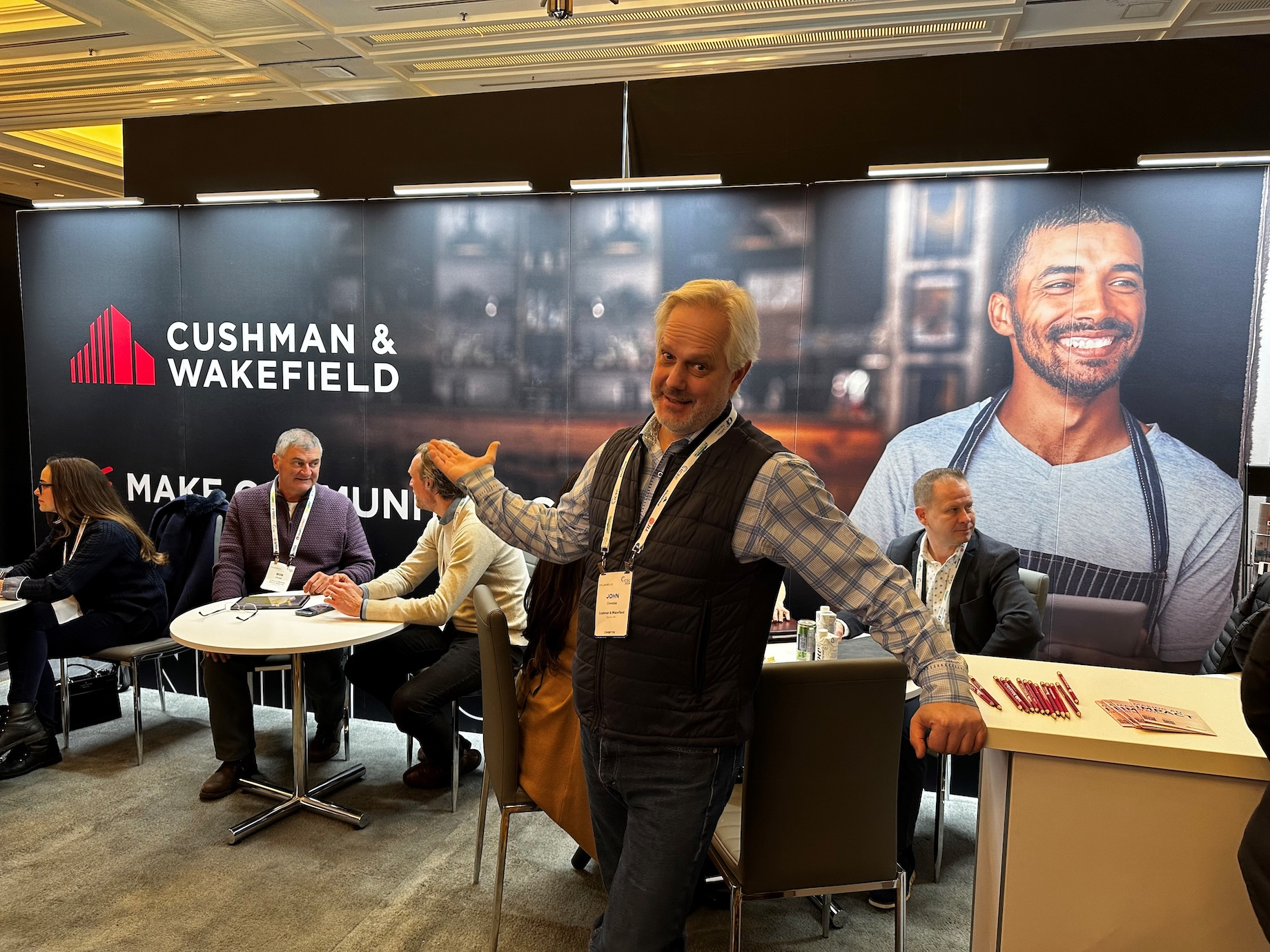
A quarter century after John Crombie’s first ICSC event — in 1999 in Whistler, British Columbia — he was still attending, manning the Cushman & Wakefield booth at ICSC@WHISTLER in January 2024. Photo courtesy of John Crombie
Crombie keeps up his guitar chops with his band Warehouse Boys, which covers acts like Bob Dylan, Neil Young, ZZ Top and Canadian country rock group Blue Rodeo. He also focuses on balancing work and family life with his wife of 35 years, Judith, who he said is keenly interested in all things retail, and their two grown children, Andy and Anne, both accomplished skiers.
“When you love something enough, you give everything to it,” said Crombie, who was interested in real estate as a child. “It easy to be dedicated and persevere when you really like what you are doing in both life and work. It’s what I did with guitar playing and skiing, and it’s what I did with ICSC.”
—Joe Gose
Hear more from Crombie about his professional journey and work with ICSC in the video below.
Gerald Pouncey Jr. Guides the Future of Environmental and Land-Use Policy
There’s a good chance that anyone who has been involved in brownfield redevelopment has come in contact with the work of Gerald Pouncey Jr. Over the past three decades, Pouncey has been both an active participant and staunch advocate for brownfield redevelopment.
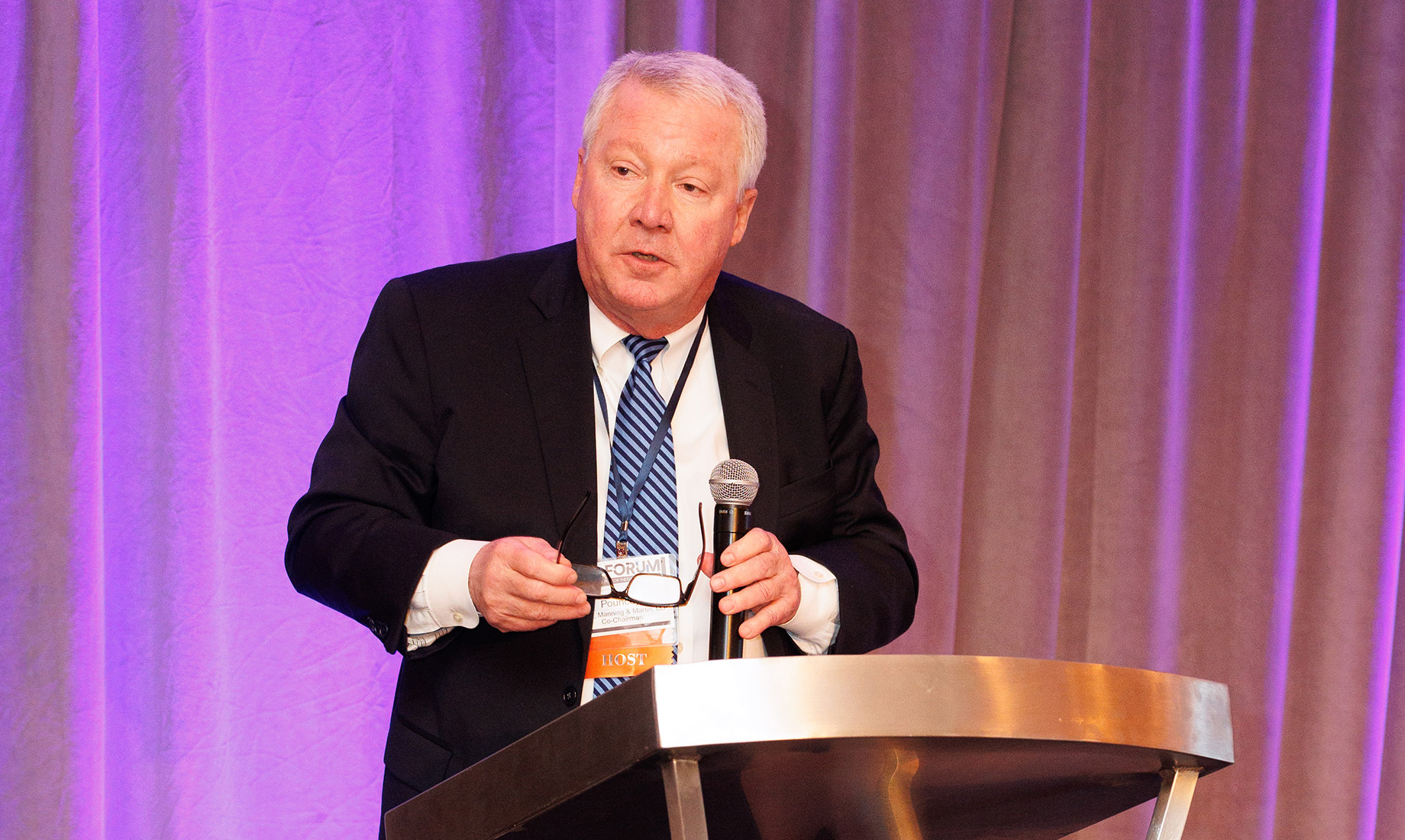
Gerald Pouncey Jr. speaks at an event put on by Morris, Manning & Martin, the law firm where he serves as senior partner and chair, heading its environmental and infrastructure practices. Photo by CatMax Photography
As a senior partner and chair, he heads law firm Morris, Manning & Martin’s environmental and infrastructure practices. He joined the firm in 1986, and much of his career has focused on the acquisition, disposition and redevelopment of properties with significant environmental impact, including state and federal Superfund sites. He also has developed, negotiated and implemented financial incentives that allow these projects to take place.
Pouncey is a longtime member of the ICSC Environmental and Land Use Policy Committee, chairing it from 2020 to 2024. “Under Gerald’s leadership, the [committee’s] roster and attendance has grown,” said ICSC senior vice president of public policy Abby Jagoda. “We are so fortunate to have access to Gerald’s expertise, strategic mindset and passion for the industry.”
Pouncey saw the committee through a challenging policy landscape. His expertise was sought by the U.S. Senate Committee on Environment & Public Works, where he served as a witness during a 2022 hearing on the reauthorization of the National Brownfields Program.
He led the creation of the ICSC Brownfields Toolkit, a guidebook for developers to take advantage of the incentives associated with brownfield redevelopment. He also has served as a panelist at numerous ICSC events and has represented ICSC in external speaking engagements on environmental policy.
Among his professional awards and accolades, Chambers USA has voted Pouncey one of America’s Leading Lawyers for Business, and Atlanta magazine has honored him numerous times as a Georgia Super Lawyer. In 2016, The National Law Journal recognized him as an Energy and Environmental Trailblazer, and in 2017, The Best Lawyers in America named him Environmental Lawyer of the Year.
Pouncey credits his success in environmental law in part to his undergraduate degree in chemical engineering. As a student who needed to pay for his own education, he saw that he likely would need to work for several years before law school. He took a practical approach, choosing an engineering degree that came with an opportunity to co-op, meaning he could work for a quarter and then go to school for a quarter. “That allowed me to save up enough money in the work quarters to be able to pay for my schooling in the spring and the fall,” said Pouncey. He planned to work full time after graduating but instead landed a full scholarship that allowed him to go straight to law school at the University of Georgia.
His chemical engineering background has been a huge advantage throughout his career. Before going vertical, brownfield and urban infill redevelopments require plans not just for site cleanup but also for infrastructure, explained Pouncey. Then there are all the tax components and economic incentives that may or may not exist. “That engineering degree helped me to think and learn to solve problems,” he said.
Pouncey graduated from law school in 1985 and was still early in his career when lawmakers passed significant environmental legislation, including the Superfund Amendments and Reauthorization Act of 1986, that impacted real estate development. Pouncey’s background in chemical engineering led Morris, Manning & Martin to hire him — an opportunity that ultimately positioned him to lead the firm’s environmental law practice. “It was a bit of a happenstance in terms of how I ended up in the environmental arena, but once we got in it, the one intentional thing I did was focus our practice more on urban infill redevelopment,” he said.
Since then, he has led efforts in the permitting, financing, acquisition, redevelopment and regulatory closure of hundreds of industrial properties, mines and landfills throughout the U.S. Notably, he served as lead counsel for the Atlantic Station redevelopment in Atlanta, which is one of the nation’s largest brownfield redevelopments. Pouncey stated: “I love the work. I love the challenge. I love the strategies where we try to make these developments economically feasible.”
He is most proud of drafting, or in some cases assisting in the drafting, of brownfield legislation across the country. In his home state of Georgia, for example, he served as a legislative appointee to the commission formed to review reauthorization of Georgia’s Hazardous Waste Trust Fund. As part of the committee, he was the principal author of the state’s brownfield legislation. In the 20 years that legislation has been in place, almost 2,000 Georgia properties have gone into that program for cleanup.

Gerald Pouncey Jr., an Auburn University alum, delivered the keynote address at the school’s fall commencement ceremonies in December. Photo courtesy of Gerald Pouncey Jr.
Though Pouncey has been involved with ICSC’s Environmental and Land Use Policy Committee for nearly 25 years, he is quick to credit its achievements to a larger team. “Under prior leadership and then during the time I was chair of the committee, we collectively have been able to accomplish a great number of things,” he said.
Among those accomplishments, the committee has dramatically raised the profile and reputation of ICSC within the broader environmental community, including stakeholders like the EPA, Congress and the U.S. Army Corps of Engineers. As part of a task force formed by the EPA, ICSC had a meaningful voice in drafting improvements to the federal Superfund legislation during President Donald Trump’s first administration. The Environmental and Land Use Policy Committee also worked with the EPA to develop a national database of environmentally impacted sites that have undergone significant remediation.
“We’ve had the opportunity to raise the prominence of brownfield redevelopment and the value of that redevelopment such that it receives much higher attention congressionally and within the EPA,” said Pouncey. The committee is focusing on legislative developments, including new regulations related to so-called forever chemicals, or per- and polyfluoroalkyl substances.
Todd Berlinghof, a partner in Hamilton Partners, has served on the ICSC Environmental and Land Use Policy Committee with Pouncey for more than 15 years and is also a former chair. “Gerald has generously donated his time and expertise to help frame our position on numerous environmental issues,” said Berlinghof. “He has been instrumental in successfully lobbying both the EPA and Congress, ensuring that the interests of our members are heard and protected.”
Forty-five years after Superfund legislation was first introduced, plenty of work still lies ahead for Pouncey, as the size and scope of redevelopment opportunities remain immense. As he pointed out: “There’s no shortage over the next many decades for brownfield redevelopment and the need to continue to pursue these efforts.”
—Beth Mattson-Teig
Watch the video below to learn more about Pouncey's influence.
How Sam Shenkus Shaped Hawaii’s Retail Landscape
In her four decades in Hawaii, Helene “Sam” Shenkus has made a lasting impact on the Marketplaces Industry. But when the opportunity to move there first came her way, she wasn’t sure she’d take it. In 1984, Shenkus was working for Dayton Hudson Corp and had recently become general manager of Eastland Mall in Detroit.
Ala Moana Center in Honolulu, which was under new ownership and in need of a marketing director, approached her. She hesitated. “I was not someone who had dreamed of coming to Hawaii,” Shenkus said. “It wasn’t on my bucket list.”
Hawaii’s culture was different from what she knew. “The people were really nice, the weather was beautiful, but the vibe was more relaxed than I was used to.” Even business attire reflected this. “You could be the president of a bank, and you’d have a very high-quality aloha shirt, a Rolex watch and great shoes but no suit or tie unless you were going to court.”
Retail, too, seemed slower. Walking through department stores, Shenkus noticed that shirts lacked magnetic inventory tags, which were standard on the mainland. “I asked the general manager: ‘How do you know what people are buying?’ He smiled and said: ‘Our customers buy what we have to sell.’” Shenkus wasn’t convinced, but she was intrigued. “I thought I’d be there for three years, then go back to Detroit,” she said.
Instead, her career in Hawaii flourished. She became a key player in its retail scene, serving as marketing director for Ala Moana Center and Aloha Tower Marketplace, vice president of marketing for the tour company Roberts Hawaii and, since 2007, head of marketing for The Festival Cos., a developer, owner and operator.
She’s also helped shape ICSC’s presence in Hawaii. “She’s passionate about ICSC and deeply understands our members,” said ICSC vice president of volunteer engagement Michael Cowden. “Without Sam, we wouldn’t have had such successful programs in Hawaii.” For Shenkus, supporting ICSC was a natural extension of her work. “You should support your industry, and ICSC is the industry,” she pointed out.
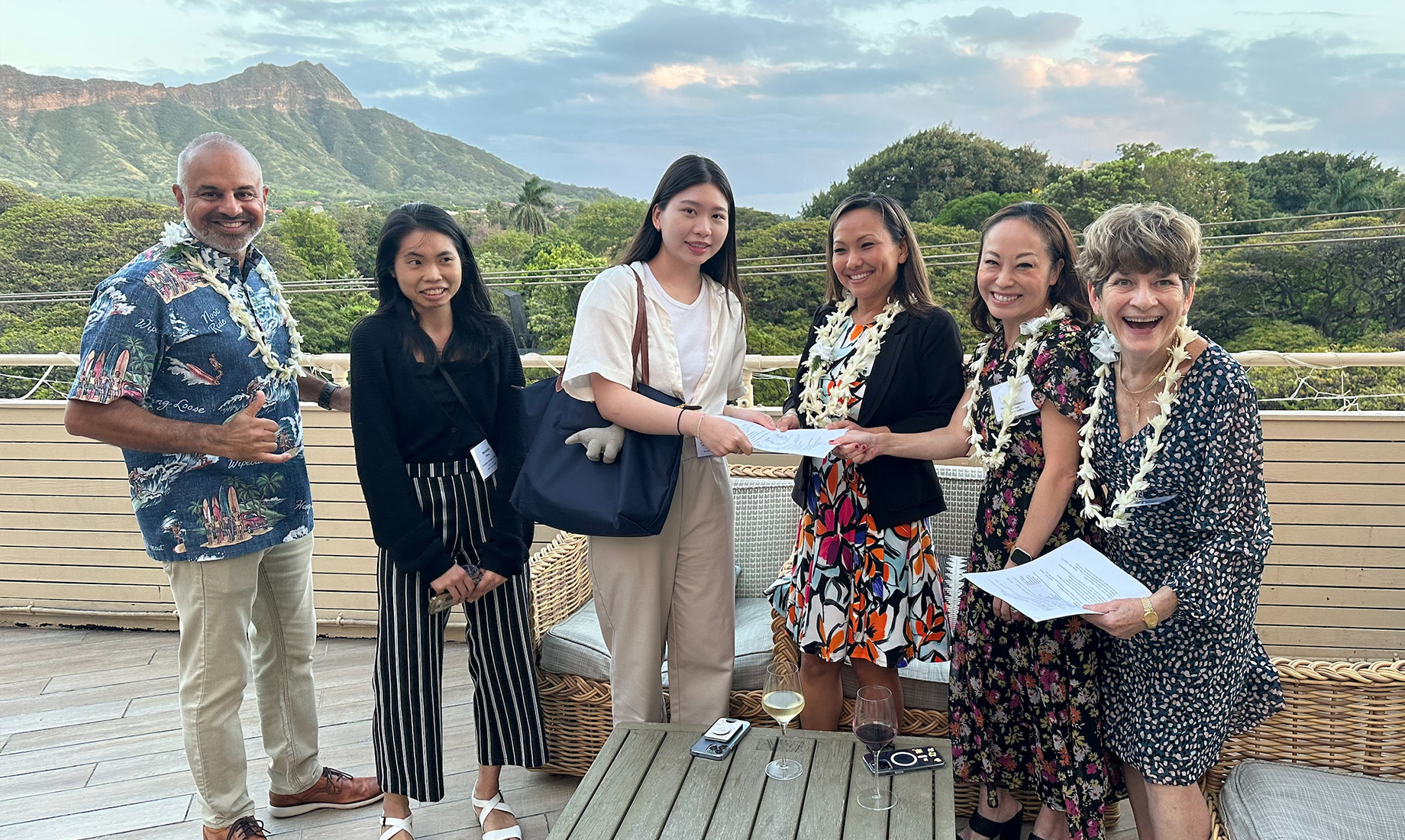
Sam Shenkus, at right, and Koa Project Management’s Jaz Nijjar, at left, connected with University of Hawaii students at an ICSC LOCAL HAWAII event in 2023. Photo courtesy of Sam Shenkus
Shenkus’ biggest challenge upon arrival at Ala Moana Center was making the center a destination, especially when beaches were the competition. Foot traffic wasn’t the issue. Engagement was. She wondered: “We had people, but how could we get a bigger share of wallets? The center could say: ‘Oh, we’re big. You have to come here.’” But Shenkus wanted to create more energy and excitement.
For the center’s 25th anniversary, for instance, she devised a headline-grabbing giveaway for a reserved parking spot for a year, gold in a city with limited parking. Expecting thousands of entries, she upped the spectacle, pulling the winner’s name from a concrete mixer while hosting a band, additional giveaways and one of Hawaii’s biggest entertainers. Her team thought she was crazy until they saw the results. “People were shopping while waiting for the drawing. They were getting something to eat.”
Shenkus continued using events to drive sales, designing promotions that required shoppers to walk through the center. “It added a sense of fun. You weren’t just getting out of your car, going to Sears and leaving,” she said. Along the way, she earned store managers’ trust and helped shift their mindset, showing that tracking sales by category rather than just stocking what was available could improve both customer experience and revenue.
She found creative ways to drive traffic at The Festival Cos., as well, winning four ICSC MAXI Awards for innovative marketing campaigns during her 18 years there thus far, she said. In 2019, she spearheaded Welcome to Our Legacy. The campaign, which invited visitors to explore Royal Hawaiian Center’s rich history and cultural legacy, won a Gold MAXI. Through international print, digital and social media, the initiative secured premium placements across key markets, from Hawaii and the rest of the U.S. to Japan and Korea. The results were significant: Spending by tourists rose 2.8%, and sales at the property surged 12.1%.

Every year, Royal Hawaiian Center hosts an annual Halloween costume contest with an average of 400 contestants in four categories. And each year Shenkus gives each of the contestants a bag of candy and a helping hand as they navigate the stairs off the stage. Photo courtesy of Royal Hawaiian Center
But Shenkus was most proud of the work she led in 2021 to help Royal Hawaiian Center adapt to the pandemic with a safe, family-friendly holiday experience. Festivities included beloved characters in storefront windows, a drive-thru Halloween event and a Santa snow globe photo op. “We wanted kids to be able to have some normal type of joy,” she said. Shenkus thought maybe 100 cars would come for the Halloween drive-thru. “We got hundreds and hundreds of cars,” she recalled. “It was backed up a mile.” The most touching moment came when a boy, dressed in a costume and using a breathing tube, was waving to the characters.
“Sam truly is the gold standard for our industry,” said Festival co-founder and CEO Rosalind Schurgin, who recruited Shenkus. “Her high energy and ability to organize make all her events exceptional.”

In 2020, Shenkus helped Royal Hawaiian Center adapt to the pandemic with a safe, family-friendly holiday experience. Festivities included a Santa snow globe photo op. “We wanted kids to be able to have some normal type of joy,” she said. Shenkus gave macadamia nut cookies to all the participants. Photo courtesy of Royal Hawaiian Center
For Shenkus, it always comes back to people. That’s also why she values ICSC, which she joined in 1989. “The shopping center industry is all about people,” she said. “Walk into any shopping center at 2 a.m., and it’s empty. It’s the people who bring it to life.” The professionals behind the scenes also play a role, and Shenkus wanted them to network and connect to continue to improve the retail community in Hawaii. “I believe you never learn less,” she said of peer interactions like those that occur at ICSC events.
From 2012 to 2015, Shenkus served as ICSC Hawaii Operations Chair, then as Hawaii State Director until 2019. When that term ended, she figured she’d let others take the lead. After all, as Schurgin pointed out, “she had given her time unconditionally for over 20 years.” But in 2023, when ICSC Hawaii needed leadership again, Shenkus stepped out of volunteer-retirement to reassume the role of Marketplace Council director. The move maintained ICSC’s presence in Hawaii. “I felt it was my duty,” she said.
Shenkus’ drive to serve extends beyond ICSC. She was the first woman member of her local Rotary Club and later its first woman president. She also served as president of her condo board for four years. “I guess I’m good at running things nobody else wants to do,” she laughed, “but things need to get done. I have the time, energy and the ability to get others to help.”
Her commitment to groups like these also speaks to her deep connection to Hawaii. As co-chair of the Aloha Festivals board of directors since 2012, she has worked to celebrate and perpetuate Hawaiian culture. And though Shenkus once doubted aloha shirts, she now often wears the traditional flowing mu’umu’us. She explained: “I consider Hawaii my home.”
—Rebecca Meiser
Find out more about Shenkus’ path in the video below.
Betsy Laird Has Spent More Than 2 Decades Advocating for ICSC
A love of politics and a desire to make a difference shaped the path Betsy Laird forged from college to Capitol Hill.
Laird grew up in Williamsport, Pennsylvania, and stayed close to home to attend Penn State. But it was an internship in Washington, D.C., the summer after her freshman year that set the stage for her professional career.
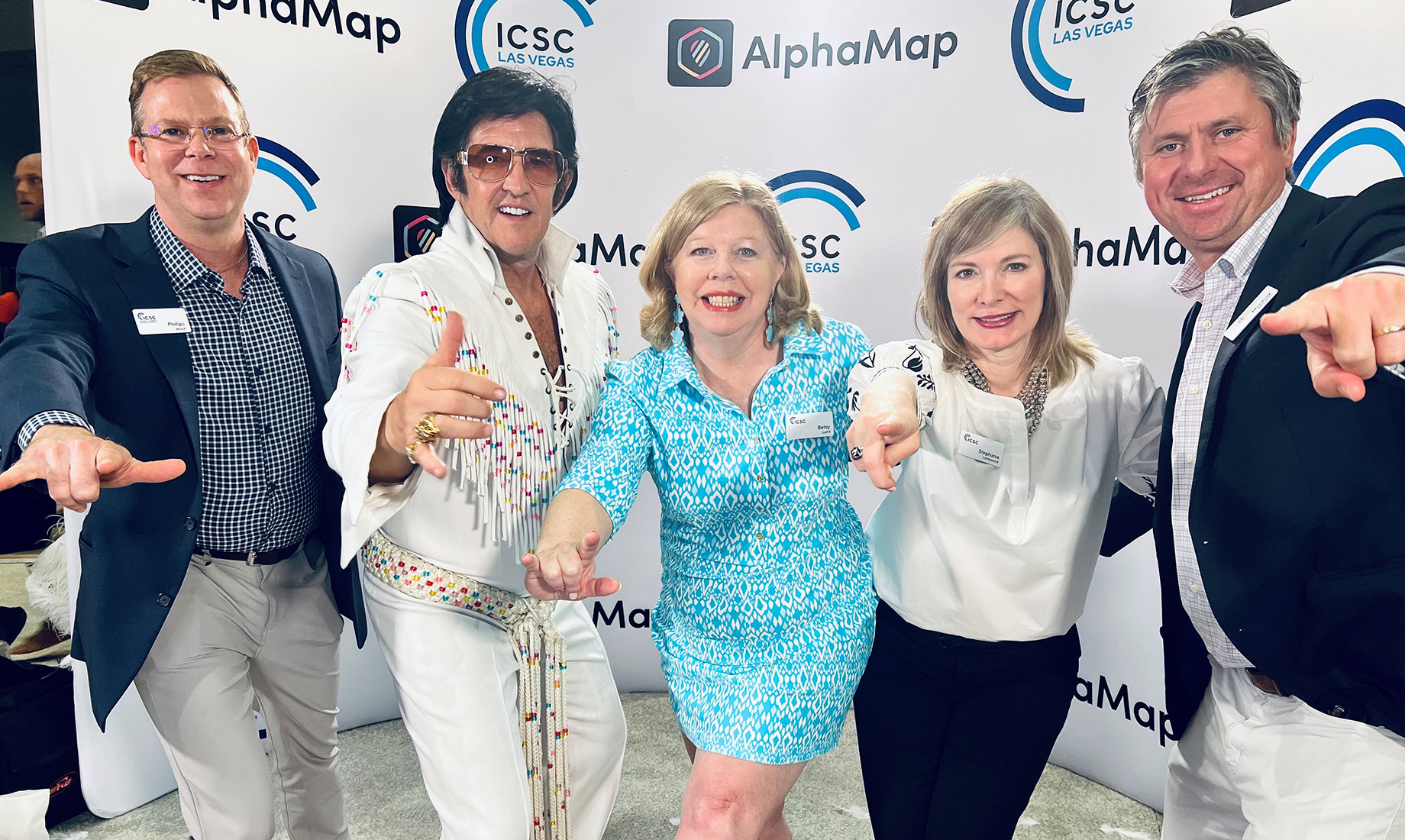
Betsy Laird, center, at ICSC LAS VEGAS in 2023 with colleagues Phillips Hinch, at far left, Stephanie Lockwood, second from right, and Moutray McLaren. Photo courtesy of Betsy Laird
From there, Laird went on to work for Nancy Johnson, who represented Connecticut in the House for 24 years until 2007 and was part of a powerful bloc of moderate Republicans. She was also the first Republican woman named to the House Ways & Means Committee.
“Every day was exciting,” Laird said. “The congresswoman and her chief of staff, Kathleen Harrington, lived and breathed what I believe is a formula for success, combining smarts, hard work and toughness tempered with a boundless sense of humor and kindness. Those two remarkable women left a lasting impression on me.”
While working on Capitol Hill, Laird earned her law degree through Catholic University’s Columbus School of Law evening program. “Law school served as a great foundation for all the various legislative issues I have encountered through the years. It also confirmed that I never wanted to practice law but instead use that knowledge as a lobbyist,” she said.
Next came a job handling tax issues for the Associated Builders and Contractors, a national trade association for the construction industry, and then a short stint with Time Warner Cable, which was particularly appealing given Laird’s undergraduate degree in communications and media.
In 1994, Laird joined the advocacy team at National Public Radio on the same day that then-House Speaker-designate Newt Gingrich said he wanted to “zero-out” federal funding for public broadcasting. “My time at NPR was during its fight for survival, and we used every tool in the lobbying handbook,” Laird said. “It culminated in 1997 when a measure to eliminate funding was voted down in a Republican-controlled House. Rarely does one get to experience that type of do-or-die scenario. I was thrilled when we prevailed.”

Laird in Washington, D.C., with Rappaport’s Gary Rappaport in 2015 to lobby for sales tax fairness. Photo courtesy of Betsy Laird
Laird was working for the International Franchise Association as assistant general counsel and head of government relations when the opportunity to join ICSC came in 2003. She was hired as a senior director and quickly promoted to staff vice president, becoming a senior vice president in 2006. “The first people I met were Jimmy Maurin and Gary Rappaport, both ICSC trustees and very involved with government affairs,” she said. Maurin, founder of Stirling Properties, served as ICSC chair from 2004 to 2005. Rappaport, founder of an eponymous firm, chaired ICSC from 2002 to 2003.
“Early on, I was charged with building ICSC’s reputation on Capitol Hill and ramping up the battle for sales tax fairness. To accomplish those goals, we needed to move our office to Washington from Virginia and expand our team.” The industry already had been grappling with the e-fairness issue for more than two decades, Laird said. When she started working on it, “the goal was to make sure online-only retailers charged, collected and remitted sales tax, just as brick-and-mortar retailers did.”
In 2011, then-ICSC chair David Henry spearheaded efforts to make a substantial investment in a public affairs campaign, which evolved into a broad industry coalition led by the association. Though progress was made, repeated efforts in Congress to enact sales tax legislation stalled. It took a 5-4 Supreme Court decision in South Dakota v. Wayfair in 2018 to do what Congress would not, Laird said. “This overdue win for the industry finally leveled the playing field and provided states and localities with much-needed revenue, especially during the e-commerce pandemic boom,” she said.
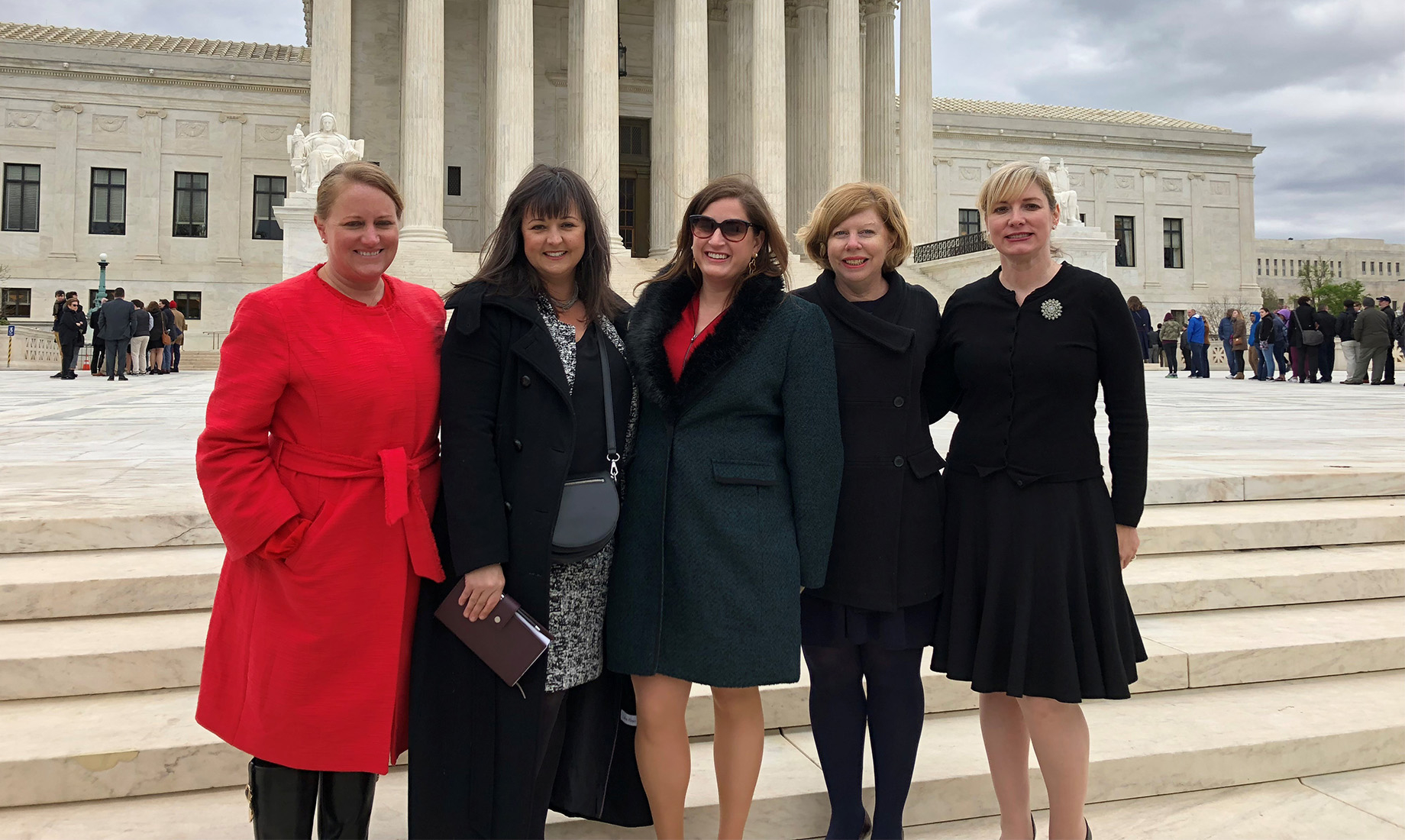
The Supreme Court heard oral arguments in South Dakota v. Wayfair on April 17, 2018. Laird attended with, from left, ICSC’s Stephanie Cegielski, former ICSC colleague Jennifer Platt, and ICSC’s Abby Jagoda and Stephanie Lockwood. Photo courtesy of Betsy Laird
The pandemic and its aftermath brought other industry challenges. “I will always remember her grit and determination,” said ICSC president and CEO Tom McGee. “During the pandemic, Betsy and I would speak daily. There was such a high level of uncertainty in Washington about how to handle the situation, and so much rested on government intervention. Physical retail was mostly closed and our members were scared and unsure, but Betsy dug down and went to work to make sure the concerns of our members and industry were understood and considered. She was incredible and her commitment to our members was inspiring.”
After more than 20 years of leading what is now called the Office of Government Relations & Public Policy, Laird has made an equally lasting impression on ICSC Members. DLC founder and CEO Adam Ifshin, a past ICSC trustee, likes to tell the story of when he testified before a congressional tax committee hearing on carried interest in 2007.
“The day before the hearing, we were working feverishly on the statement and navigating a dozen or more real estate groups who wanted their say,” Ifshin recalled. “Betsy, who was nine months pregnant with twins, worked all day and stayed into the night, making sure that even a recalcitrant ICSC photocopier would not derail the delivery of my statement to the committee. The following morning [while I was] in a car to Capitol Hill, my cellphone rings. It’s Betsy, from the delivery room, polishing my statement and suggesting changes. She’s asking if I’m OK. Who multitasks advocacy and delivery? Betsy Laird.” The hearing was a success, carried interest was defeated and Laird delivered a healthy boy and girl.
“I’ve worked with Betsy now for almost a decade and she’s been a wonderful partner,” McGee added. “She genuinely and deeply cares about our members — their interests, their businesses. She understands that their success impacts the success of their communities. Simply put, she gets it.”
Laird will begin her next chapter this summer when she retires and moves with her family to Delaware. “It’s been a wonderful career working alongside great people and representing a dynamic industry with fascinating members,” she said. “My experience with ICSC has given me a profound feeling of accomplishment that I will always treasure. I wish Tom McGee and the organization continued success.”
—Stephanie Lockwood